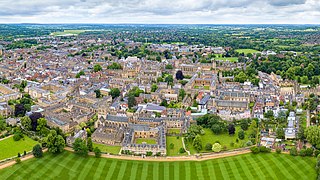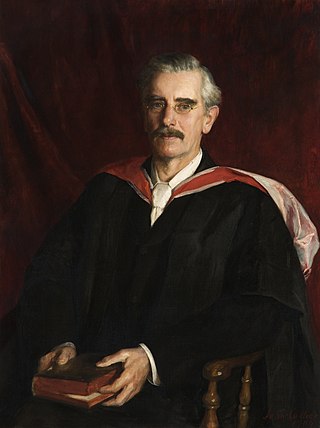
Universities in the United Kingdom have generally been instituted by royal charter, papal bull, Act of Parliament, or an instrument of government under the Further and Higher Education Act 1992 or the Higher Education and Research Act 2017. Degree awarding powers and the 'university' title are protected by law, although the precise arrangements for gaining these vary between the constituent countries of the United Kingdom.

The ancient universities are British and Irish medieval universities and early modern universities founded before the year 1600. Four of these are located in Scotland, two in England, and one in Ireland. The ancient universities in Britain and Ireland are amongst the oldest extant universities in the world.

Mansfield College, Oxford is one of the constituent colleges of the University of Oxford in Oxford, England. The college was founded in Birmingham in 1838 as a college for Nonconformist students. It moved to Oxford in 1886 and was renamed Mansfield College after George Mansfield and his sister Elizabeth. In 1995 a royal charter was awarded giving the institution full college status. The college grounds are located on Mansfield Road, near the centre of Oxford.

Nonconformists were Protestant Christians who did not "conform" to the governance and usages of the state church in England, and in Wales until 1914, the Church of England.

The Act of Uniformity 1662 is an Act of the Parliament of England. It prescribed the form of public prayers, administration of sacraments, and other rites of the Established Church of England, according to the rites and ceremonies prescribed in the 1662 Book of Common Prayer. Adherence to this was required in order to hold any office in government or the church, although the new version of the Book of Common Prayer prescribed by the Act was so new that most people had never even seen a copy. The Act also required that the Book of Common Prayer "be truly and exactly Translated into the British or Welsh Tongue". It also explicitly required episcopal ordination for all ministers, i.e. deacons, priests and bishops, which had to be reintroduced since the Puritans had abolished many features of the Church during the Civil War. The act did not explicitly encompass the Isle of Man.
In English history, the penal laws were a series of laws that sought to uphold the establishment and State decreed religious monopoly of the Church of England against illegal and underground Catholics and Protestant nonconformists by imposing various forfeitures, civil penalties, and civil disabilities upon recusants from mandatory attendance at weekly Anglican Sunday services. The penal laws in general were repealed in the early 19th century during the process of Catholic Emancipation. Penal actions are civil in nature and were not English common law.
The Test Acts were a series of penal laws originating in Restoration England, passed by the Parliament of England, that served as a religious test for public office and imposed various civil disabilities on Catholics and nonconformist Protestants.

Renn Dickson Hampden was an English Anglican clergyman. His liberal tendencies led to conflict with traditionalist clergy in general and the supporters of Tractarianism during the years he taught at the University of Oxford (1829–1846) which coincided with a period of rapid social change and heightened political tensions.
An ad eundem degree is an academic degree awarded by one university or college to an alumnus of another, in a process often known as incorporation. The recipient of the ad eundem degree is often a faculty member at the institution which awards the degree, e.g. at the University of Cambridge, where incorporation is expressly limited to a person who "has been admitted to a University office or a Headship or a Fellowship of a College, or holds a post in the University Press ... or is a Head-elect or designate of a College".
A collegiate university is a university in which functions are divided between a central administration and a number of constituent colleges. Historically, the first collegiate university was the University of Paris and its first college was the Collège des Dix-Huit. The two principal forms are residential college universities, where the central university is responsible for teaching and colleges may deliver some teaching but are primarily residential communities, and federal universities where the central university has an administrative role and the colleges may be residential but are primarily teaching institutions. The larger colleges or campuses of federal universities, such as University College London and University of California, Berkeley, may be effectively universities in their own right and often have their own student unions.

Francis Macdonald Cornford was an English classical scholar and translator known for work on ancient philosophy, notably Plato, Parmenides, Thucydides, and ancient Greek religion. Frances Cornford, his wife, was a noted poet. Due to the similarity in their names, he was known in the family as "FMC" and his wife as "FCC".
Jewish emancipation in the United Kingdom was the culmination in the 19th century of efforts over several hundred years to loosen the legal restrictions set in place on England's Jewish population. Between 1833 and 1890 Parliament passed a series of laws that placed male Jews in the United Kingdom on an equal legal footing with the kingdom's other emancipated males.

The Roman Catholic Relief Act 1829, also known as the Catholic Emancipation Act 1829, removed the sacramental tests that barred Roman Catholics in the United Kingdom from Parliament and from higher offices of the judiciary and state. It was the culmination of a fifty-year process of Catholic emancipation which had offered Catholics successive measures of "relief" from the civil and political disabilities imposed by Penal Laws in both Great Britain and in Ireland in the seventeenth, and early eighteenth, centuries.

The third-oldest university in England debate has been carried out since the mid-19th century, with rival claims being made originally by Durham University as the third-oldest officially recognised university (1832) and the third to confer degrees (1837) and the University of London as the third university to be granted a royal charter (1836). These have been joined more recently by University College London as it was founded as London University (1826) and was the third-oldest university institution to start teaching (1828) and by King's College London. Most historians identify Durham as the third-oldest, following standard practice in how a university is defined and how this is applied historically, although the popular press is more divided.
The dissenting academies were schools, colleges and seminaries run by English Dissenters, that is, Protestants who did not conform to the Church of England. They formed a significant part of education in England from the mid-seventeenth to nineteenth centuries.
Numa Edward Hartog was a Jewish British mathematician who attracted attention in 1869 for graduating from Cambridge University as Senior Wrangler and Smith's Prizeman but as a Jew had not been admitted to a fellowship. Hartog's case led to the passage of the Universities Tests Act of 1871, which removed religious barriers to holding fellowships at Oxford and Cambridge.

The Toleration Act 1689, also referred to as the Act of Toleration, was an Act of the Parliament of England. Passed in the aftermath of the Glorious Revolution, it received royal assent on 24 May 1689.
William Charles Lake was Dean of Durham and Warden of its university from 1869 to 1894.
The Liberation Society was an organisation in Victorian England that campaigned for disestablishment of the Church of England. It was founded in 1844 by Edward Miall as the British Anti-State Church Association and was renamed in 1853 as the Society for the Liberation of Religion from State Patronage and Control, from which the shortened common name of Liberation Society derived.

Augustus Samuel Wilkins (1843–1905) was an English classical scholar. He held a professorship of Latin in Manchester for 34 years.











